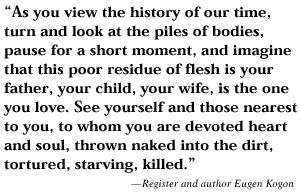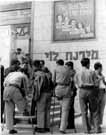
|
|
|

|

|

|

|
|
Click on an image to see a larger, more detailed picture.
|
|
|
|
|
| EPILOGUE: The Aftermath |

|
pg. 655 |

|
|
|
|
| |
|
|
|
|
|
|
| |
The
day stops when the sirens scream at eight o'clock. Two minutes later an Israeli morning goes on as usual, but not entirely. It is Yom ha-Sho'ah, the April day that commemorates the Holocaust. Observances are held in many countries now, but this annual remembrance was first established in 1951 by the Knesset, Israel's parliament. The Jewish lunar calendar puts Yom ha-Sho'ah on the 27th day of the month of Nisan, the anniversary of the beginning of the Warsaw Ghetto uprising, April 19, 1943. Not long after Yom ha-Sho'ah, Yom Atzmaut (Israeli Independence Day) is celebrated on Iyyar 5, the anniversary of the day when Israeli statehood was announced: May 14, 1948. The two days' close proximity is not accidental. It suggests that from the ruin and resistance of the Warsaw Ghetto, from the destruction and defiance of the Holocaust, Jewish life finds renewed vitality in Israel. Nevertheless, screaming as they do before the celebration of Israeli independence, the sirens sound multiple warnings: Be vigilant; do not take Israel's existence for granted. Be realistic; do not assume that the Holocaust will never be forgotten, let alone that genocide is a thing of the past. Be undeceived; do not suppose that Israel's existence "makes up" for the Holocaust. Be careful; do not imagine, at least not easily, that the state of Israel reaffirms the covenant between God and the Jewish people. Be clearheaded; do not preempt the Holocaust by making its evil instrumental, the means that somehow produced a "greater good.

The sirens' scream should not diminish joy about the state of Israel, pride in its accomplishments, or hope for the Israeli future, including a secure peace with often hostile Arab neighbors. Nor should the sirens' scream mean that Jewish identity is synonymous with victimhood. Least of all should Yom ha-Sho'ah's sirens deny that post-Holocaust Jewish life is thriving. To the contrary, the sirens can and should be heard, at least in part, as expressions of courage and confidence that Jewish life is here to stay--strong, vibrant, and, at its best, what the biblical prophet Isaiah called "a light to the nations." A Kingly Dream The modern state of Israel celebrated its 50th anniversary in 1998. Yearnings for a Jewish state, however, are much older. In the late 1800s, Austrian-Jewish leader Nathan Birnbaum led a Jewish nationalist group known as Hovevei Tziyon (Lovers of Zion). He gets credit for introducing the term Zionism in 1893. Since that time, Zionism has been, in part, a response to antisemitism. It also expresses an affirmation of distinctively Jewish culture and a nationalistic commitment to found and sustain a Jewish homeland by political means. Historically, Zionist aspirations have reflected varied political, cultural, and religious persuasions. Some Zionists have been politically on the left, others on the right; some secular, others religious; some more militant, others less so. However, their common cause has been to support and defend a state for Jews in territory earlier called Palestine and even earlier, in biblical times, possessed by the Jews themselves.
|

|

|

|

|
|

A few months after Israel's independence, Jewish amputees stand outside a theater in Tel Aviv. The Hollywood film The Best Years of Our Lives focuses on Americans returning home after the war.
Photo: Leni Sonnenfeld Photographer
|
|
|
|
|
| EPILOGUE: The Aftermath |

|
pg. 655 |

|
|
The Holocaust Chronicle
© 2009 Publications International, Ltd.
|
|
